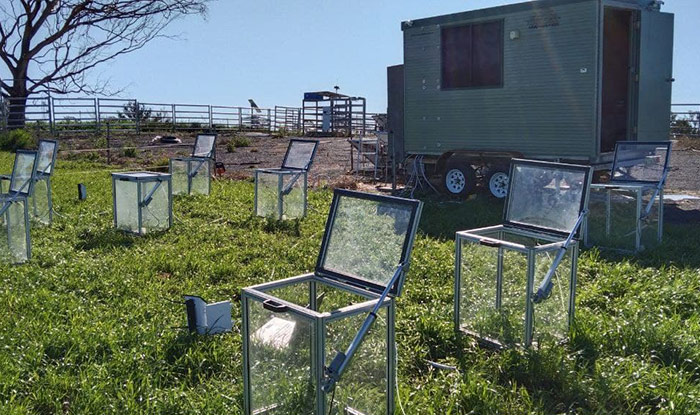However, to be sustainable, future dairy systems will need to be C neutral and environmentally friendly. It is imperative to quantify the true environmental impact of intensively managed Kikuyu-based systems including impact on C emissions.
Our aim is to identify and evaluate options for C-neutral dairy production from Kikuyu-based systems

Our approach and methods
The work includes a review of literature, establishing of base situation and modelling of C-neutral scenarios (Year 1); monitoring C emissions from pasture, C sequestration in the soil, as well as quantifying CH4 and CO2 gases from individual dairy cattle (year 2+). This will be done using the most recent technology including breath analysers for cattle, soil chambers and environmental GHG measuring equipment. Data acquired from soils, pastures and animals will allow us to quantify the real environmental impact of different production systems and management practices with increased accuracy.
GreenFeed breath analysers for cattle emissions (Waghorn et al., 2016; Denninger et al., 2019) and soil chambers and equipment to measure fluxes of GHG in the environment will be used on research station and/or selected participating commercial farms. Measurements from animal and soils will be used to fine tune advanced modelling tools to quantify and more accurately predict, true environmental impact of the different production systems.
Progress
Project Update (December 2023)
This Dairy UP project will help the NSW Dairy industry to meet the industry’s emissions reduction targets.
Publication (July 2025)
Greenhouse gas emissions of confinement- and pasture-based dairy farms: Implications for mitigation.
Publication (May 2025)
Short-term effect of grazing on net ecosystem exchange and fluxes of greenhouse gases in C3 and C4 pastures during the growing season.
Publication (March 2025)
Potential applications of a low-cost gas sensor to monitor enteric methane emission from ruminant animals
Publication (March 2024)
Dietary concentrate supplementation increases milk production and reduces predicted greenhouse gas emission intensity in pasture-based commercial dairy farms.
Related Articles
Project Lead

Professor Luciano Gonzalez
University of Sydney | Nancy Roma Paech Chair in Sustainable Livestock Production
You can help
If you are interested in this project or think you may want to be involved at some stage, please contact Luciano on luciano.gonzalez@sydney.edu.au.
Project Team:
- Mulisa Dida – USyd – PhD Student – mulisa.dida@sydney.edu.au
For more information contact
Prof. Yani Garcia (sergio.garcia@sydney.edu.au) or Prof. Luciano Gonzalez (luciano.gonzalez@sydney.edu.au)
This research is funded by the Dairy UP initiative (https://dairyup.com.au/) and it is expected to benefit all farmers with kikuyu pastures.

